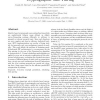Free Online Productivity Tools
i2Speak
i2Symbol
i2OCR
iTex2Img
iWeb2Print
iWeb2Shot
i2Type
iPdf2Split
iPdf2Merge
i2Bopomofo
i2Arabic
i2Style
i2Image
i2PDF
iLatex2Rtf
Sci2ools
129
click to vote
IJNSEC
2008
2008
Parallel Hardware Architectures for the Cryptographic Tate Pairing
Identity-based cryptography uses pairing functions,which are sophisticated bilinear maps defined on elliptic curves.Computing pairings efficiently in software is presently a relevant research topic. Since such functions are very complex and slow in software, dedicated hardware (HW) implementations are worthy of being studied, but presently only very preliminary research is available. This work affords the problem of designing parallel dedicated HW architectures, i.e.,co-processors, for the Tate pairing, in the case of the Duursma-Lee algorithm in characteristic 3. Formal scheduling methodologies are applied to carry out an extensive exploration of the architectural solution space, evaluating the obtained structures by means of different figures of merit such as computation time, circuit area and combinations thereof.Comparisons with the (few) existing proposals are carried out, showing that a large space exists for the efficient parallelHW computation of pairings.
Elliptic Curves.Computing Pairings | IJNSEC 2008 | Parallel Dedicated Hw | Sophisticated Bilinear Maps |
Related Content
| Added | 12 Dec 2010 |
| Updated | 12 Dec 2010 |
| Type | Journal |
| Year | 2008 |
| Where | IJNSEC |
| Authors | Guido Marco Bertoni, Luca Breveglieri, Pasqualina Fragneto, Gerardo Pelosi |
Comments (0)

